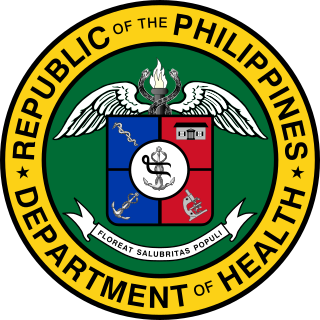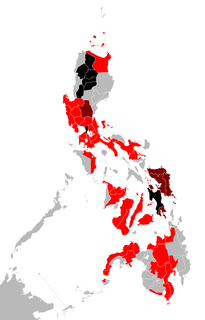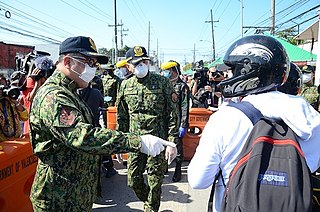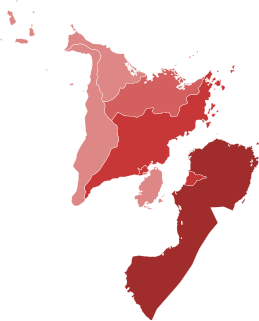
Panfilo "Ping" Morena Lacson Sr. is a Filipino senator who served from 2001 to 2013; and again from 2016 to the present. He is a retired police officer who headed the Philippine National Police from 1999 to 2001.

The Department of Health is the executive department of the Government of the Philippines responsible for ensuring access to basic public health services by all Filipinos through the provision of quality health care and the regulation of all health services and products. It is the government's over-all technical authority on health. It has its headquarters at the San Lazaro Compound, along Rizal Avenue in Manila.

Aquilino Martin de la Llana Pimentel III, commonly known as Koko Pimentel, is a Filipino politician and lawyer currently serving as a Senator of the Philippines. He was the 28th Senate President of the Philippines from 2016 to 2018. He is also the current party president of Partido Demokratiko Pilipino–Lakas ng Bayan (PDP–Laban). As the eldest son and third child of the former Senate President Aquilino Pimentel Jr., he is the first child of a previous Senate president to hold the office. He was sworn in on August 12, 2011 and was proclaimed as the 12th winning senator in the 2007 election.

The 2009 swine flu pandemic was confirmed to have spread to the Philippines on May 21, 2009, when a 10-year-old girl contracted the H1N1/09 virus after travelling with her family to Houston, Texas, United States. In the following days, several local cases were reported to be caused by contact with two infected Taiwanese women who attended a wedding ceremony in Zambales.

Paulyn Jean Buenaflor Rosell-Ubial is a Filipino physician. She is the former Secretary of the Philippine Department of Health.
The Dengvaxia controversy, Dengvaxia issue, or Dengvaxia mess is an ongoing controversy about the use of anti-dengue vaccine Dengvaxia in the Philippines. In late November 2017, the Department of Health (DOH) suspended a school-based vaccination program utilizing French drug-based vaccine maker Sanofi Pasteur's Dengvaxia vaccine because reports circulated that several children died from various complications allegedly attributed to the dengue vaccine. Shortly after, the company made a statement that its product poses higher risks to people without prior dengue infection.
A diplomatic crisis began between the countries of Kuwait and the Philippines in early 2018 over concerns of the latter over the situation of Filipino migrant workers in the gulf country.
The Philippine presidential and vice presidential elections of 2022 is scheduled to be held on Monday, May 9, 2022, as part of that year's general elections. This will be the 17th presidential election in the Philippines since 1935 and the seventh sextennial presidential election since 1986.

The 2019 Philippines measles outbreak began in early 2019. An outbreak of measles was officially declared in February 2019 in select administrative regions in Luzon and Visayas including Metro Manila by the Philippine government. The outbreak is attributed to lowered vaccination rates, from a high of 88% 10 to 15 years previous to 74% at the time of the outbreak, allegedly caused by the Dengvaxia controversy.
2020 in the Philippines details events of note that have occurred, or are scheduled to take place, in the Philippines in the year 2020.

The eruption of Taal Volcano in Batangas, Philippines on January 12, 2020, was a phreatomagmatic eruption from its main crater that spewed ashes across Calabarzon, Metro Manila, and some parts of Central Luzon and Ilocos Region, resulting in the suspension of school classes, work schedules, and flights in the area. The Philippine Institute of Volcanology and Seismology (PHIVOLCS) subsequently issued an Alert Level 4, indicating "that a hazardous explosive eruption is possible within hours to days."

The ongoing pandemic of coronavirus disease 2019, a novel infectious disease caused by severe acute respiratory syndrome coronavirus 2, spread to the Philippines on January 30, 2020, when the first case of the disease was confirmed in Metro Manila. It involved a 38-year-old Chinese woman who was confined in the San Lazaro Hospital in Manila. The second case was confirmed on February 2, that of a 44-year-old Chinese man who died a day earlier, which was also the first confirmed death from the disease outside mainland China. The first case of someone without travel history abroad was confirmed on March 5, a 62-year-old male who frequented a Muslim prayer hall in San Juan, Metro Manila, raising suspicions that a community transmission of COVID-19 is already underway in the Philippines. The man's wife was confirmed to have contracted COVID-19 on March 7, which was also the first local transmission to be confirmed.

The COVID-19 pandemic was confirmed to have spread to Metro Manila, Philippines on January 30, 2020, when the first case of COVID-19 was confirmed in the City of Manila. After a month of no new cases in the country, the first case of someone without travel history abroad was confirmed on March 5, a 62-year-old male who frequented a Muslim prayer hall in San Juan, Metro Manila, raising suspicions that a community transmission of COVID-19 is already underway in the Philippines. The man's wife was confirmed to have contracted COVID-19 on March 7, which was also the first local transmission to be confirmed. Metro Manila is the worst affected region in the Philippines, where most cases are recorded. A state of calamity and community quarantine have been in place in the region since March 15.

On March 16, 2020, the government of the Philippines under President Rodrigo Duterte imposed an enhanced community quarantine (ECQ) in Luzon, which is effectively a total lockdown, restricting the movement of the population except for necessity, work, and health circumstances, in response to the growing pandemic of coronavirus disease 2019 (COVID-19) in the country. Additional lockdown restrictions mandated the temporary closure of non-essential shops and businesses. The ECQ came in after two days of the implementation of the community quarantine in Metro Manila.
The COVID-19 testing controversy is an ongoing controversy in the Philippines involving several government officials who were reported in media to have been tested for coronavirus disease 2019 (COVID-19) in the first months of the pandemic in the country. This violated the triage algorithm used by the Department of Health (DOH), which said that asymptomatic patients should not be tested, and should instead be put under 14-day home quarantine.
This article documents the timeline of the COVID-19 pandemic in the Philippines.

As a measure to limit the spread of coronavirus disease 2019 (COVID-19) in the Philippines, lockdowns, officially characterized as "community quarantines" by the government, of varying strictness was imposed in numerous parts of the Philippines. The enhanced community quarantine, is the strictest of such measures. The largest of these measures was the Luzon enhanced community quarantine.

The COVID-19 pandemic was confirmed to have spread to Central Luzon, Philippines on March 9, 2020, when the first case of coronavirus disease 2019 (COVID-19) was confirmed in San Jose del Monte, Bulacan. All provinces except Aurora has confirmed at least one COVID-19 case.

The COVID-19 pandemic was confirmed to have spread to Western Visayas, Philippines on March 20, 2020, when the first case of coronavirus disease 2019 (COVID-19) was confirmed in Bacolod. All provinces except the island province of Guimaras has at least one confirmed COVID-19 case.













